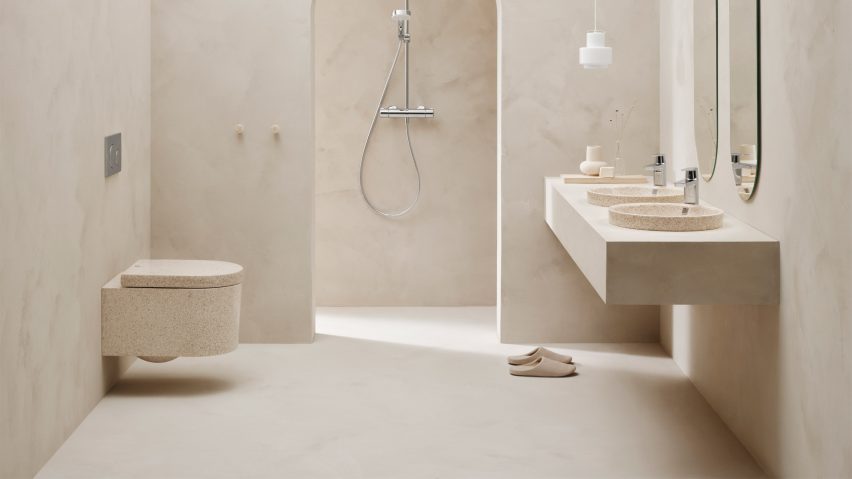Finnish design company Woodio has created a toilet, where everything from the seat to the bowl is formed from wood composite that reportedly generates 99 per cent fewer emissions in its production than ceramics.
Named Block, the wall-mounted toilet was made using a material developed by Woodio founder Petro Lahtinen that is around 80 per cent wood by volume, incorporating locally sourced aspen and offcuts from the Finnish forest industry.
These wood chips were mixed with a combination of fossil-based polyester and bioplastic resins to create a composite that is both waterproof and "practically unbreakable", the company claims.
Lahtinen says its production process requires no heat and a fraction of the water and energy needed to create traditional ceramic or porcelain toilets, which are typically fired in kilns at above 1,000 degrees Celsius for several hours.
"There is nothing wrong with ceramic itself," he told Dezeen. "It is the manufacturing process of the ceramics that causes the environmental impact."
"Typically, industrial ceramics are fired at 1,500 degrees Celsius for at least 12 hours and this heat is produced typically by burning gas, which obviously causes considerable CO2 emissions."
Depending on the product, Woodio claims its production process generates up to 99 per cent fewer emissions than that used to create traditional ceramic sanitaryware.
However, this does not consider any emissions from material sourcing or disposal, which can have a huge impact on a product's overall footprint.
"The savings are particularly focused on the gate-to-gate phase," Lahtinen said.
"Even our products need to be transported and disposed at the end of life, and also raw material sourcing has to be included."
Lahtinen originally developed the Woodio composite material back in 2017 and the company has since turned it into everything from bathtubs to wash basins using a patented cast moulding technique.
"Basically we have developed moulds that can handle non-fluid raw materials," Lahtinen said. "It is a really innovative method."
The Block toilet is the company's most intricate and complicated product to date, developed over the course of three years and designed in collaboration with Finnish studio Pentagon Design.
While sawdust and wood shavings have traditionally been used to help break down the waste in off-grid composting toilets, Woodio claims its version is the "world's first" flush toilet to be made from the material.
However, the wood composite still relies on several fossil-based resources, including polyester resin as well as various additives and surface treatments, although the company is planning to use only bio-based resins once it moves to an industrial factory in the next few years.
The fact that the material is a composite will also make the toilet almost impossible to recycle at the end of its life, which is usually around 10 to 15 years but can go all the way up to 50.
Woodio argues the toilet can be burned for energy at the end of its life to prevent it from ending up in landfill. But this would release both the fossil carbon and the carbon stored in the wood into the atmosphere.
Previous efforts to make toilets more sustainable have focused largely on reducing or eliminating their water consumption. To this effect, the Sandi concept toilet uses sand and a tiny conveyor belt to dispose of waste while a recent Samsung prototype instead combusts it into ashes.

